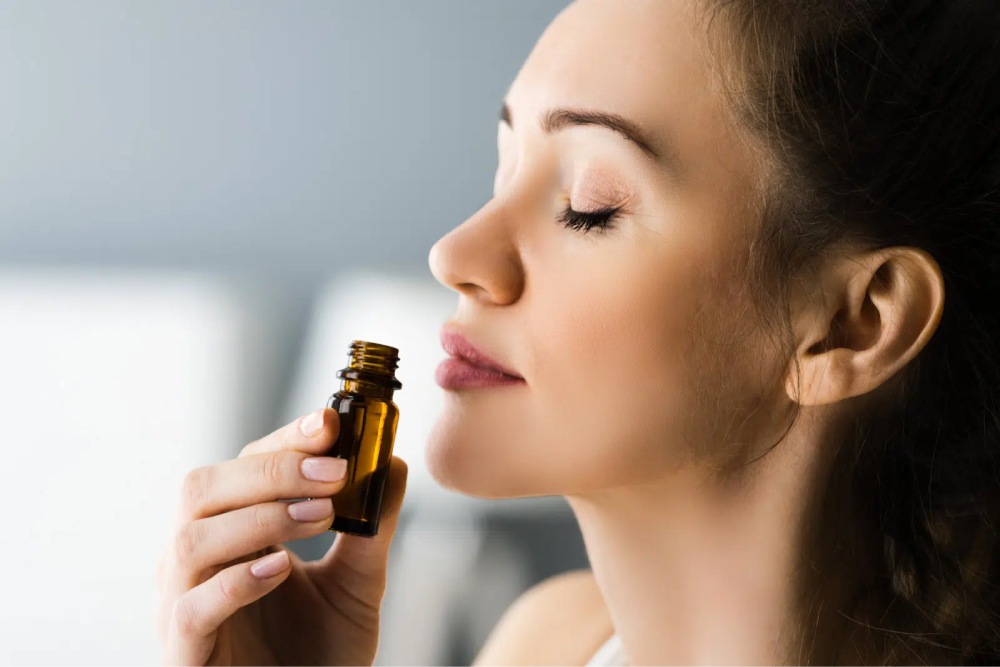Disclaimer: This post was developed via a partnership with BetterHelp.
Essential oils have been gaining popularity for their potential benefits, ranging from soothing headaches to promoting better sleep. These concentrated, plant-based oils have a long history of being used in various cultures for their therapeutic properties.
Let’s take a deep dive into the world of essential oils, their potential impact on mental health, and how to use them safely.
Table of Contents
What Are Essential Oils?
Essential oils are extracts derived from different plant components, such as flowers, bark, leaves or even fruit. The extraction process involves steaming or pressing the plant to capture the compounds responsible for fragrance. These oils serve various functions within their respective plants, beyond providing a pleasant scent.
The practice of aromatherapy uses essential oils for their therapeutic and relaxation benefits. This ancient practice has been used for centuries, with scent molecules from essential oils traveling directly to the brain’s emotional center, the amygdala, when inhaled. Additionally, essential oils can be absorbed through the skin, making them versatile for various applications, including addition to massage oil or as skincare ingredients.
Essential Oils and Mental Health: The Connection
As mental health concerns, particularly anxiety and depression, have risen globally, many people are exploring alternative treatments like essential oils. While the exact mechanism is not fully understood, scientists believe that the olfactory pathway triggered by scents may influence the hormonal system, releasing endorphins and balancing emotions.
Many mental health experts, including online therapy platform BetterHelp, have begun to recognize the benefits of using essential oils in conjunction with more traditional therapies, like talk therapy or Cognitive-Behavioral Therapy.
In addition, recent studies have investigated the potential benefits of essential oils for mental health. And while early results are promising, larger clinical trials are needed. Some research has shown a reduction in anxiety levels through aromatherapy, and aromatherapy massage has been associated with relaxation, improved sleep and enhanced mood.
Essential Oils for Anxiety and Depression
Several essential oils are commonly associated with anxiety and depression relief. It’s important to keep in mind that essential oils are not a cure for any mental health condition – but they are a drug-free option that may help manage symptoms. In general, essential oils are considered as adjunctive therapies and should not be used as the sole treatment for a mental health condition.
- Lavender: Known for stress and anxiety reduction.
- Cedarwood: Grounding and anxiolytic properties.
- Bergamot: Uplifting and stress-reducing effects.
- Chamomile: Soothing and commonly used for stress relief.
- Frankincense: Calming effects, particularly during meditation.
Ways to Use Essential Oils
There are many different ways to tap into the benefits of essential oils. Here are a few of the most popular:
- Aromatherapy accessories: Wearable items infused with oils.
- Bath oil and salts: Enhance relaxation during a warm bath.
- Hair and skin care: Infuse oils into personal care products.
- Massage: Combine oils with a carrier oil for a soothing massage.
- Diffuser: Disperse scented vapor around a room.
- Room spray: Easily spread essential oil scents throughout a space.
Essential Oil Safety
Using essential oils safely is key. Basic good practices include safe diffuser usage, avoiding ingestion, watching for skin reactions, and carefully reading labels. Certain populations, such as children, pregnant individuals, and pets, may need extra precautions. Some essential oils are more likely to cause issues, such as oregano, cinnamon bark, jasmine, lemongrass, ylang-ylang, chamomile, bergamot, and others. You should also dilute pure essential oils with a carrier oil, like jojoba or almond, to avoid skin reactions. And, of course, if you experience an allergic reaction, you should seek medical attention as soon as possible.
Be aware that navigating the market for essential oils can be a challenge because there’s currently no standardized grading system. When shopping, consider factors like the label information, company reputation, packaging in dark-colored glass containers, and avoidance of “fragrance oils.”
The quality of essential oils varies, and not all products on the market are created equal. The safest ways to use generally include aromatherapy accessories, body oil application and aroma sticks. When in doubt, talk with your doctor about the safest way to add essential oils to your treatment regimen.
The Bottom Line
While essential oils offer a holistic approach to mental well-being, they are not a substitute for professional medical treatments. Consulting with a healthcare professional will help you get the most benefits from essential oils in the safest possible way.
Essential oils have the potential to support overall mental health, but caution and informed use are essential. They can nicely complement more traditional mental health strategies but should not replace evidence-based interventions.
As we continue to explore holistic approaches to well-being, essential oils emerge as a fragrant and promising ally in the journey to mental health.

